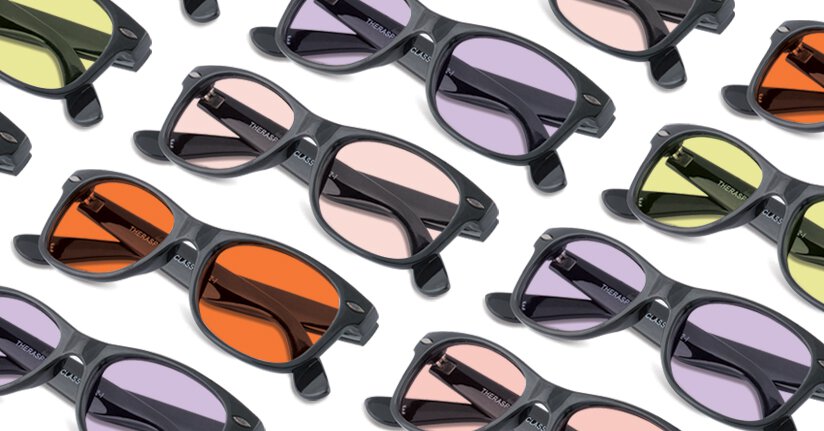7 Things People With Traumatic Brain Injuries Want You to Know
A traumatic brain injury (TBI)—which includes concussions or mild TBIs—can be life-changing, yet few people know what it’s really like to live with one. We reached out to TheraSpecs customers who have had traumatic brain injuries, including some who live with persistent post-concussion syndrome, to ask them to share what they wish people understood about living with the aftermath of a TBI. We share five customers’ experiences below in their own words.
1. A mild TBI isn’t minor
Don’t use the phrases such as “It’s ONLY concussion” or “It’s a MILD dose of concussion.” There is nothing minor about what I feel or experience. -Mary-Anne M.
There's no such thing as a "little" concussion. A concussion is a brain injury, plain and simple. If you're lucky, and don't get additional concussions, you can hopefully heal up after a few weeks or a couple of months. If you're not so lucky (like about 20% of people who get concussions), you can find yourself with life changing symptoms. -Gabrielle S.
This is a traumatic brain injury. Although considered a “minor” TBI, it is completely life altering. -Laura D.
2. Despite being invisible, TBIs can be life-altering
Concussion sufferers may have hidden symptoms and look normal but not “feel right” so people may treat them like there is nothing wrong. Physically I have no injuries to see so people cannot understand why I wear tinted glasses or headphones or say no to social events etc. Friends don’t know how to help and are scared of me. Some have become very distant which is disappointing. Other people don’t seem to have any empathy and dismiss my brain injury. This makes me very angry. Please listen if someone says they have a brain injury and they can’t understand what you are telling them. Don’t just keep talking about a complicated issue to them – they may have brain fog and can’t take it all in. -Mary-Anne M.
Concussions can wreak havoc on your life, especially if it turns into post-concussion syndrome. Invisible illnesses matter just as much as physical ones and should be taken just as seriously. -Angela M.
3. Symptoms following a TBI can be wide-ranging
Many symptoms, aside from chronic daily migraines include light sensitivity (photophobia) and sound sensitivity (phonophobia). I have had balance issues and vertigo. I can’t drive long distances on wide open roads such as highways... Migraines and severe eye pain ensue. I have sleep disturbances that I have never had before. -Laura D.
People with concussion may not be able to return to work or undertake their social and recreational hobbies etc quickly. This had been difficult for me, my family and friends to understand—especially after so many months. I have had to modify my work practices and only work very part time at home. I avoid all events such as going to the gym, markets, movies, concerts, travel, singing groups etc as they are usually too bright and loud. As a friend or relative please try to compromise and be considerate when socialising with a concussive. -Mary-Anne M.
Proper care like lots of rest, getting tools to help reduce light and sound sensitivity (like TheraSpecs and good ear plugs) and stress management are vital to recovery! -Gabrielle S.
4. Recovering from a TBI takes time
It may take longer to heal than expected. I’m currently 7 months post-concussion and still have symptoms and I am not working at my old job or doing any of my old activities especially those in groups or crowds. I’m very apprehensive about going into environments that may trigger my symptoms to get worse. Tolerance for stress may be extremely low—I know mine is! -Mary-Anne M.
5. People with TBIs can fatigue easily
My brain is like a battery that is never fully charged. I start my day at about 75%. It doesn't go higher than that. Each thing I do during activity drains my battery. The only way to recharge the battery is to rest. If I have to drop my children at school and I also have to go to the grocery store, I must come home to rest in between those two things. If I need to pick up the kids from school at 3:30, I have to plan any errand so I have enough time to rest before I have to pick them up. If I have a surprise birthday party at 7:00 pm, I must rest from the time I get home from school with the kids until it's time to get ready for the party. Once I get to the surprise party, I have to bring my ear plugs and a hat. Because of the noise, I will probably only be able to stay about 30 minutes. I can literally feel my battery draining. I have to get home before my battery gets to zero. -Amy B.
6. People need social support while recovering from a TBI
A concussed person needs help and support to get the information that can help them. When your brain isn't working well, it is challenging, if not impossible to reason properly and take the steps necessary to recover well—your loved ones and friends need to help you with that. -Gabrielle S.
Concussion patients may end up feeling isolated, lonely and invisible as they try to recover in a non-stimulating environment. Being alone with your injury can be depressing and frustrating and it’s hard to stay motivated. As a friend or relative please remember to regularly ask after the person with concussion. Send a text or an email. Pick them some flowers, send a card, phone them and have a chat. Have a cup of tea or coffee with them. Walk on the beach or in a quiet park with them. Don’t ignore them or forget about them. They are usually not contagious!! They need to learn how to smile again! -Mary-Anne M.
I would like people to be kind and patient with those that have post concussive syndrome. No one can see it or prove it. It is subjective. Life altering. -Laura D.
7. The brain—and humans—are resilient
The brain is resilient with the ability to heal. Fight for yourself, become your own advocate, never give up and don't let anyone tell you that you are less than because you have limitations. -Angela M.
TheraSpecs Glasses for Your Health
Try our therapeutic glasses and get relief for issues triggered by light, such as migraines, headaches, photophobia, concussion symptoms, seizures, eye health, and sleep.





